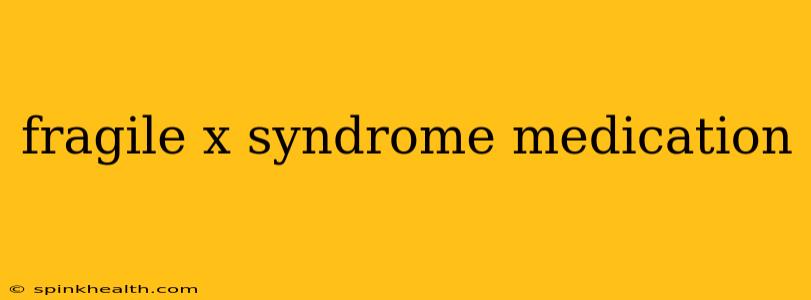Fragile X syndrome (FXS), the most common inherited cause of intellectual disability, presents a unique set of challenges. While there's no cure, significant progress has been made in understanding FXS and developing treatments to manage its symptoms. This journey, however, is often a complex one, navigating a landscape of behavioral therapies, educational interventions, and, in some cases, medication. Let's delve into the world of Fragile X syndrome medication and explore the current approaches.
What Medications are Used to Treat Fragile X Syndrome?
There isn't a single "Fragile X medication" that targets the underlying genetic cause. Instead, treatments focus on managing the specific symptoms a person with FXS experiences. These symptoms can vary widely, making personalized treatment plans crucial. Commonly used medications address issues like:
-
Anxiety and irritability: Many individuals with FXS experience heightened anxiety and irritability. Selective serotonin reuptake inhibitors (SSRIs), such as fluoxetine (Prozac) or sertraline (Zoloft), are often prescribed to help manage these emotional challenges. These medications work by increasing the level of serotonin in the brain, a neurotransmitter associated with mood regulation. In some cases, other antidepressants or anti-anxiety medications may be considered.
-
ADHD-like symptoms: Attention-deficit/hyperactivity disorder (ADHD)-like symptoms, including hyperactivity, impulsivity, and difficulty focusing, are common in individuals with FXS. Stimulants, like methylphenidate (Ritalin) or amphetamine/dextroamphetamine (Adderall), can be beneficial in improving attention and reducing hyperactivity. However, it’s crucial to monitor for side effects and adjust dosage as needed.
-
Autism spectrum disorder (ASD) symptoms: A significant percentage of individuals with FXS also have ASD. Medications used to manage ASD symptoms often focus on addressing specific behavioral challenges, such as repetitive behaviors or self-injurious behaviors. In such instances, risperidone (Risperdal) or aripiprazole (Abilify) might be considered, but their use requires careful monitoring due to potential side effects.
-
Seizures: Although less common, seizures can occur in individuals with FXS. Anti-epileptic drugs (AEDs) are prescribed to control seizures. The specific AED will depend on the type and frequency of seizures.
It's imperative to remember that medication is just one piece of the puzzle. A comprehensive treatment plan, developed in consultation with a team of specialists, including a geneticist, neurologist, psychiatrist, and developmental pediatrician, is essential.
What are the Side Effects of Medication for Fragile X?
The side effects of medication can vary greatly depending on the specific drug and the individual. Some common side effects associated with medications used to treat FXS symptoms include:
- SSRIs: Nausea, headache, insomnia, weight changes, and decreased libido.
- Stimulants: Decreased appetite, sleep disturbances, increased heart rate, and anxiety.
- Antipsychotics: Weight gain, drowsiness, increased prolactin levels (which can lead to menstrual irregularities in females), and movement disorders (tardive dyskinesia).
- AEDs: Dizziness, drowsiness, nausea, and coordination problems.
It's crucial to discuss potential side effects with a healthcare professional before starting any medication. Regular monitoring is also essential to identify and manage any adverse effects that may arise.
What other therapies are used to manage Fragile X Syndrome?
While medication plays a vital role in managing specific symptoms, it's crucial to remember that a holistic approach is best. This includes:
Behavioral Therapies
Behavioral therapies, such as applied behavior analysis (ABA), play a crucial role in improving social skills, communication, and adaptive behaviors. Occupational therapy focuses on improving fine motor skills, and speech therapy assists with communication challenges.
Educational Interventions
Early intervention and specialized educational programs are essential for children with FXS. These programs provide individualized support tailored to the child's specific needs and learning style.
What is the long-term outlook for individuals with Fragile X Syndrome?
The long-term outlook for individuals with FXS varies greatly, depending on the severity of symptoms and the availability of appropriate support. With early intervention, comprehensive therapies, and appropriate medical management, individuals with FXS can lead fulfilling lives. The emphasis should always be on maximizing their potential and supporting their overall well-being.
Does Fragile X Syndrome have any specific dietary considerations?
There isn't a specific diet recommended for all individuals with FXS. However, some individuals may benefit from dietary modifications to manage certain symptoms, such as gut issues or sensory sensitivities. Consulting a dietitian or nutritionist specializing in developmental disabilities can be beneficial to create a personalized dietary plan.
Are there any clinical trials currently underway for Fragile X Syndrome?
Research into FXS is ongoing, with numerous clinical trials investigating new treatments and therapeutic approaches. Information on current clinical trials can be found through resources like ClinicalTrials.gov. Always consult with a healthcare professional before participating in any clinical trial.
This information is intended for educational purposes only and should not be considered medical advice. Always consult with a healthcare professional for diagnosis and treatment of Fragile X syndrome. A tailored treatment plan, considering individual needs and symptoms, is crucial for managing this complex condition.

